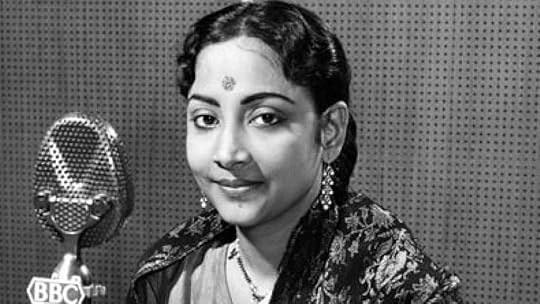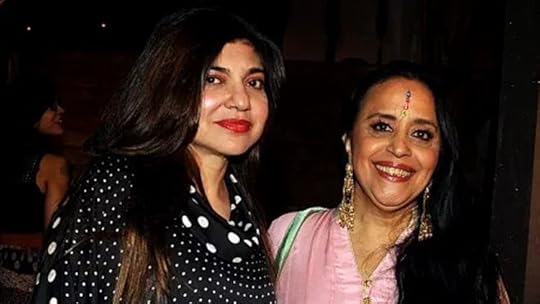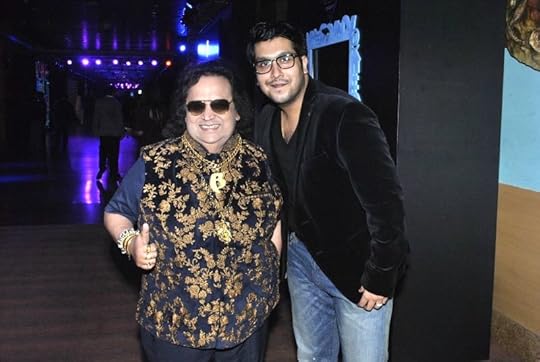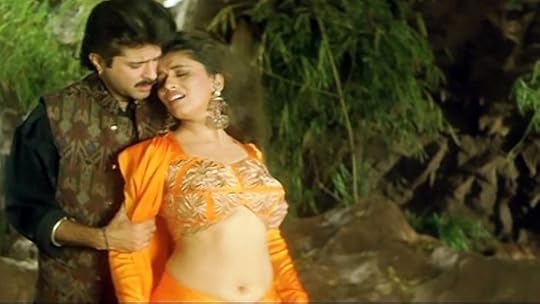Manish Gaekwad's Blog, page 10
July 19, 2019
The Melody of Geeta Dutt
Guru Dutt gets a taste of his singer wife’s tantrums during the recording of Na Jao Saiyaan in Sahib Biwi Aur Ghulam.

Geeta Dutt absolutely insisted on visiting the sets to watch Meena Kumari perform in Sahib Bibi Aur Ghulam. She wanted to study Meena’s languorous body language and her soapy expressions for the playback she was doing for the film.
“Aami kicchu suntay chai na (I don’t want to hear anything),” she flared up with the nerve of a bulbul bobbing its head.
“Tumi jaano, tomaar Meena Kumari jaane, Meena-e acting korao, gaan ta practise korao, aami ukke closely watch korte chai — taarporey aami gaan ta gaabo…aami toh jeeboney kokhono modd (alcohol) taste kori ni…baba re…unaake rehearsal korte dekhaar por aami bujhte paarbo gaaney ki rokam neshar bhaab (intoxicated mood) ta tumi chao,” she launched into a tirade.
(You figure out, let your Meena figure it out, make her act, make her sing, I just want to watch her closely. Thereafter, I will sing it. I have never tasted alcohol in life, good god, watching her rehearse will help me gauge how to copy the mood you want for the melody.)
“But,” Guru Dutt protested, “the song has not been composed, no tune is set, the words have just been roughly penned, how will Meena enact the song until you sing it?”
“Oi sob kotha aami jaani na baba…recording room-e aami toh modd (alcohol) khey dhukbo na…amaar kaache onno anek kaaj aacche…ekhaane toh ghar shonshar chalate hobey…ki abostha…uff…hai bhogobaan!”
(All that I don’t know, I won’t be entering the recording room intoxicated, I have too much work to look into, I have to run the household, what a plight, dear lord!)
Geeta railed and rallied off, leaving Guru Dutt to deal with her black and white portrait on the wall of the living room. A picture of such saint-eyed grace, who would have thought, looking at that photo frame, that Geeta in person could be a nag.
 The Dutts.
The Dutts.Meena Kumari readily agreed to play act for Geeta. She took long draughts from her hip-flask in the make-up room, smudged the kaajal around her sad diamond eyes and reported on the sets for drama. She sang ‘Na jao saiyaan chhudha ke baiyaan, kasam tumhari, main ro padoongi’ in her whiny out-of-tune whisky flavoured voice, replete with ‘hichkis’ for Geeta to gravitate into a stupor. She rolled her ro with more roil than the seas.
Geeta was an attentive viewer. She later sang the song in one sitting. Meena Kumari had sneaked into the recording room that day. “What are you doing here now?” Guru Dutt had asked, baffled. “Am secretly watching her sing, I have to bring the same elfishness on screen, the way she intones and how her lips waver…gulokar ka khaas andaaz,” Meena spoke in her sober appearance.
Guru Dutt gave up. He could not follow the hearts of these women the way his on-screen women ministered his.
When the film released, cine-goers swore that they didn’t want to leave Meena Kumari to her hapless wit as she pleaded ‘Na jao saiyaan’. They drove back into her arms each time she cried out in her conjugal misery. Critics agreed Meena lip-synched with such flourish that she had paid Geeta Dutt the ultimate compliment by completely super-imposing Geeta’s voice on the character of chhoti bahu and in that process, short-changing both her identity as a star and Geeta’s as a playback artist. These two took second place after their screen embodiment.
Geeta couldn’t ask for more. For her it was important that movie lovers hear the character seduce them and not her. She never wanted to be a star-singer, unlike the Maharashtrian mulgis, whose voices overpowered the heroine’s presence.
She never wanted to be surrounded by people everywhere she went. Geeta would try her best to shoo away fans who insisted she sign autographs on scraps of paper and on the back of store bills at the Versova fish market; she was too busy haggling with fisherwomen and stowing in her basket the freshest catch of rui maach for supper.
https://medium.com/media/c45a74e01fad000a6383c15e1a70c274/href
June 15, 2019
Alka Yagnik: A Stitch in Tune
The ku-ku-ku-ku-ku-ku-ku-ku of Choli Ke Peeche Kya Hai that got to her

Ila Arun’s vulgar jibes at Alka Yagnik prior to the song recording of Choli Ke Peeche did not go down well with Alka. Initially, Alka appeared unruffled and had told music directors Laxmikant-Pyarelal that she was not going to be troubled by Ila’s rural taunts. She was lying as she sipped her early morning hot water from a thermos she carried to the recording studio.
As the day progressed, Ila repeatedly grunted Choli ke peeche kya hai chori, chunari ke neeche kya hai gori? Alka eventually cracked. She was in tears and complained to LP that her senior was bullying her.
Laxmiji, Pyarelalji, she whined in a singsong tone, but to no mercy from any.
Alka had no clue what Ila was getting at till the music composers gave her the lyrics sheet and asked to hum along on their harmonium, to pick up the rhythm, and pitch. Alka thought everyone was pulling her leg, and this was all a big joke, a fun day of riyaaz in the studio. What on earth were these filthy words: Choli ke peeche kya hai, chunari ke neeche kya hai? She couldn’t bring herself together. Why were the composers making her do this?
Ila was notorious for her antics. She would tweak the songs she sang, often peppering the lyrics with her own impromptu additions, her harrumph sounds that stirred the hearts and loins of randy men. Alka was most embarrassed recording the song and was flushed red with shame whenever Ila ku-ku cooed into her mike with her orgasmic oohs and aahs as if her privates were on fire, or she was being doused and cooled.
Alka was not one to throw tantrums and she could not afford to be upset with LP for pairing her with the guttural Ila Arun. They were the people who gave her her first massive hit, Ek Do Teen in Tezaab, which not only launched her singing career, but also earned her a Filmfare best playback stripe. That was four years ago, after which, she had not been able to scale those dizzying heights again.
She kept a straight face throughout the song recording, but soon after, she excused herself and did not participate in the post-recording shindig. Alka was frightened that Ila would peep into her choli.
Arre jaa jaa, Ila chastised her, like she did in the song, when Alka reached for the door. Alka felt like a furry little rodent scurrying out from danger’s path, drenched in cold sweat.
 Alka Yagnik, Ila Arun.
Alka Yagnik, Ila Arun.Alka went home, stood in her closet and studied her image in the mirror. Was she fat? She thought not. She balked for hours, wondering if the whole exercise was to punish her for something she had done to upset LP.
Late that night, she telephoned Laxmikant, since Pyarelal didn’t have the patient ear for pity and Laxmikant would perhaps have a more assertive answer to the afternoon raga that played out in the studio.
Laxmikant told her not to worry but Alka was not convinced. It was, as she looked at the calendar on her night table, April 1. She tried to smile. Surely, the joke was on her, she was not being a sport. At nine in the evening, even Laxmikant, having downed a few glasses of whisky, would sing a different tune, she thought.
She had, after all, sung Ek do teen char paanch chhe saat aat nau dus gyarah barah tera, for them. It hadn’t sounded right at first, but look how it had gripped the nation to reward maths with affection.
A year later, at the Filmfare awards function, when her name was announced for the best playback trophy with Ila, she realised that Ila had sprinted and reached the stage before she could even stand up from her chair. Ila was screaming into a mike, Choli ke peeche kya hai Alka, chunari ke neeche kya hai Alka? Alka, was again, only too nervous to control her gait. She dithered.
As she stepped on the stage, Ila ran towards her and tried to shove the Filmfare trophy into the folds of her Anarkali kurta, announcing into the mike to all Alka fans in the audience, Where should I stow her trophy? The audience broke out in a hoorah as Alka adjusted her chunari.
When would Alka learn to drop her guard?
Clasping her trophy with both hands, held firm and pressed close to her bosom from where Choli mein dil hai mera, chunari mein dil hai mera, she had devoutly chanted in a dulcet tone, Alka preened her best defense in a shiny moment.
https://medium.com/media/b94f6d23271cc6d2f70e158cf4993d77/href
May 17, 2019
A Hip Hop song I wrote
Be nice when you listen, or try
https://medium.com/media/b0583aca6e65f1c69c34a8251a20e139/hrefWrote a hip-hop song. Don’t die please. Watch the video, then commit harakiri.
May 16, 2019
Terror’s Tongue
A couplet
 Mark Rothko, Saffron, 1957
Mark Rothko, Saffron, 1957मुछे हों तो नाथूराम जैसी
गोली तो कम्बख्त ठाकुर भी चला लेती है

April 30, 2019
Bappi Lahiri: Old is Gold
The man with the Midas touch let go of 500 million dollars

Son Bappa runs into father Bappi Lahiri’s bedroom early one morning.
Bappi is snoring steadfast. Breathing in, the chiming music of gold chains fettered to his chest gives him the appearance of a child lulled into deep sleep by the harp sounds of pram rattle. Breathing out, a humpback whale song snorts in dreamland.
‘Baba, otho, otho baba (Wake up dad),’ Bappa rubs his palm on his father’s fleshy thigh.
Bappi feels a tremor rising up his body. His bed tumultuous, like an over-crowded dinghy on calm waters. Bappi wakes up with a start.
‘Ki, ki jinis Bappa, aamake keno dishtarb korcho, aami ghumate chaee, I am lissning new tune, ektu disco track I am dreaming baba, aami mujhik ta copy korte chai, pleez leabh me aa-lone, goh away, I will diss-cuss vith eww later. (What, what business Bappa, why are you disturbing me, I want to sleep, I am listening to a new tune, a disco track I am dreaming, I need to copy the music, please leave me alone, go away, I will discuss with you later.)’
‘Uff baba, tumi jaano na, ki hoiche ki (You don’t know what has happened),’ Bappa’s speech slurs into babble.
Bappi rubs his eyes in despair. ‘Chitra,’ Bappi calls out for his docile wife.
Bappa places a hand on his father’s shoulder and begins to adjust the ornaments as if readying him for stage entry. He hands his father a DVD and says, ‘Dis eez aargent baba.’
Bappi walks over to the television cabinet and inserts the DVD into a player. The television set is turned on and a remote is slapped on Bappa’s thigh to operate it.
What appears on the screen is the video of a man’s naked back decorated in tattoo. It is strategically covered to display ink in an arabesque pattern. Lata Mangeshkar’s soothing voice hovers in the background. Camera pans out: several hands spiral up in the air, women dressed as tantalising houris begin to cavort. More music trickles in; beats, rhythm, melody, chorus, rap. An Afro-American woman shimmers and pouts her big, glossy mouth. She talks a little and shakes her rump every now and then. A rapper in tracksuit walks into the party and shakes the camera. The song segues in and out of crotch vents as dancers try to glue their bodies into one. Lata warbles along to these people, inchoate, but on full bass.
Bappi is shocked. ‘Ki ascharjo, eei toh amaar gaan,’ (What nonsense, this is my song) he excoriates, adjusting morning phlegm in his throat.
‘Ebar ki korbe baba? (What will you do now father?)’ Bappa collects his words like small change.
‘Phone ta ghoomao, HMV record office, Mister Biswas, haan, tei, Mister Biswas ei songe amaar kotha korao. (Make a call to HMV record office, Mr Biswas, yes that, Mister Biswas I want to speak to).’
Bappi, roused from his sleep, stomps his feet, stumbling into his bathroom, marching orders to his son.
He returns to grab the receiver from Bappa, flying into a rage, ‘Hello, Mister Biswas, aami sui korbo, sui.’
Bappa gently taps on his father’s jewelled shoulder, ‘Sui nei baba, su-su-su,’ repeating his syllables without a pause. He wants his father to utter the correct pronunciation for the word sue.
Bappi scolds him, ‘Ki susu-susu korcho? Jao okhane susu kore esho! Amaar hoye geche (What su-su are you doing? Go there, pee and come back! I am done pissing.)’
Bappa moves away and returns after he sees his father put the receiver down.
 Bappa with Bappi.
Bappa with Bappi.Fidgeting with his China-silk gown belt, Bappi announces, ‘US return ticket book koro, amraa du jon Amrika jaabo, sew kore taaka niye aashbo (Book US return tickets, we two will go to America, will return with lawsuit money.)’
‘Koto taaka, Baba? (How much money, father?)’
‘Five hundred million dollars!’ Bappi gleams, his eyes twinkle with dollar signs, his jewels bling in morning rays streaming through the windows.
Bappa’s eyes widen in disbelief, he cannot believe their poor days are soon going to be over. He thrusts his pelvis, and sings, ‘I am a disco…’
Bappi interrupts him, ‘Ei ta dance kore time nei, (This is no time to dance).
The father-son duo land in America, take the music label to court for using one of Bappi’s songs for a number that had made it to Billboards Top Ten.
Bappi quarrels in court, demanding his name be mentioned on billboards across all highways in foreign countries where the song is charting.
The music label pleads with Bappi Lahiri to settle the case out of court for the sum he is baying for. The defendant sings paeans of his musical genius, extolling of his showy wealth and generosity.
Bappi’s shiny heart of gold melts.
The Los Angeles court judge rules that no further music CDs should be printed without Bappi’s name on the song credits. The case is settled out of court for an undisclosed amount.
Bappa is not in favour of the settlement. He wants 500 million dollars, since talent is in short supply in their house.
Bappi believes he had done the right thing by taking a negligible token amount for his fame that will hence stun the western world.
‘Don’t worry Bappa, very soon this english peepal vill come to our house to sign me for Hollywood picture,’ Bappi triumphs, trying to console his frumpy son. He decides to take his son to Little India — the city of Artesia in the south east of Los Angeles, which has the largest Asian-Indian population in California.
They walk into the cultural shopping district, brimming to have found Indian curry in tiny shops on the pavements. Along the road, they do not avoid stepping into a glittering jewellery store — it is the most natural thing for Bappi to do anywhere.
Weighing precious gold metals in his chubby palms, Bappi asks the attendant, ‘How much, kitna tola?’
A wall mounted television starts streaming the music video of Addictive, a song by the artist Truth Hurts in which playback Lata Mangeshkar is heard singing in the background. The song is Kaliyon Ka Chaman Jab Banta Hai, composed by Bappi Da. The attendant stretches his arm up to lower the loud volume but Bappi gestures him to not do so.
Bappi stands in rapt attention, approving, ‘Bhalo gaan, wah-wah, khoob bhalo ta gaan.’ It is the video he had seen back home some days ago. He is pleased to see it again. The attendant hesitantly nods in agreement, shaking his head left-right like the famous Indian head bobble.
One of the lines in the lyrics is, ‘Heere moti jadhte hain, thoda sona lagta hai.’
Bappi caresses the lustre of the yellow metal in his hand, making it sparkle even more than usual, admiring his own Midas touch.
https://medium.com/media/a0494853b05e896f8f1613c772ba997e/hrefTrivia: On September 12, 2002, the Indian music company Saregama filed a $500 million lawsuit against Universal Music Group, and filed an injunction to prevent further performances or broadcasts of the song.

April 2, 2019
Anuradha Paudwal: The Melancholy of Sound
Someone pinched her bottom to elicit the effect of her ‘ouch’ in the song Dhak Dhak Karne Laga
 Anuradha Paudwal demonstrates the pinch.
Anuradha Paudwal demonstrates the pinch.It was her first steamy number and the Jai Mata Di bhajan queen did not know how to sing it.
Her despair tantamount, as she was explained how in the film Beta, the ever so comely village belle Madhuri Dixit would gyrate to her sensuous playback.
A week before the song recording Anuradha Paudwal trekked to Vaishno Devi from her Khar road apartment in Bombay, and pleaded with the cold mountain goddess to forgive her if the song was later going to be rejigged as ‘Mata Mata Karne Laga.’
Isn’t that how most prayers were reaching the deity’s gilded ears? O mora jiyara darne laga, Anuradha’s heart raced to those words sprinting across her troubled mind.
She could have refused to sing the song but when the scratch was played to her by the music composers Anand-Milind, Anuradha knew in her heart that the song was such a guaranteed hit that she could not let the opportunity to sing it slip. Both Alka Yagnik and Kavita Krishnamurthy were covering enough ground to leave her stranded alone in musical high waters.
Once back in Bombay after her pilgrimage, Anuradha sought the help of the lissome lass La Dixit to help her with the recording. She would need Dixit to guide her on the oomph factor. Initially, during rehearsals, Anuradha sang with a low timbre, with no thrust in her pitch.
Composers Anand-Milind were looking for a playful yet seductive quality in Anuradha’s voice. They were sure they could extract a sexiness, ‘ek madhur dhun aap ke kanth mein basey bansi se,’ (a sweet melody from the flute of your throat)’ as Anand had spelled out in those exact words. It sounded part corny and part sincere — the kind of praise she was used to. Anuradha’s voice was not easily associated with sultriness as she had made a career in singing bhajan geet in a flat, monotone pitch.
Anand particularly believed she had a quirk she was not tweaking. Milind being the more impatient of the duo would have liked to punch some more holes in her flute.
Madhuri decided to perform the song forAnuradha, to help her get a visual aesthetic to the lyrics, which Anuradha considered too bawdy for her own quiet demeanour.
‘You begin with heavy breathing, so cleave your chest and open your mouth only as wide as an oyster shell — a small but suggestive window. Then when you say ‘dhak dhak’, pull your stomach in, clench your gut, and then inhale…deep…lift your chest when you say ‘karne’ — karne requires a thrust from your bosom, and it should then cascade in your voice, after which you release air with the two syllables la-ga — this laga should have an impactful aah consonant feeling in it.’
‘Lift my chest?’ Anuradha was horrified. Bosom thrust? What insanity is this?
 Anil Kapoor, Madhuri Dixit.
Anil Kapoor, Madhuri Dixit.Anuradha was zapped at her dhak dhak instructor’s calisthenics for vocal training. Madhuri advised Anuradha to place a palm on her chest, locate her heart beat and sing with a sensation. To assuage her fears, Madhuri made the process sound sterile, like a doctor placing a stethoscope on her breast. Anuradha was aghast, and found it inappropriate to behave like that.
Madhuri, on the other hand, had already been choreographing the song in her head. ‘Trust me,’ she said, ‘Do as I say, and it will give the effect which both Sarojji and I will be able to duplicate on-screen.’
This was going to be Madhuri’s number one soft-core erotic number, no less than Sridevi’s ‘Kaatey Nahin Katt Tay’ in Mr India.
Willy-nilly Anuradha, dilly-dallied. She just couldn’t bring herself to act like that. Hours passed, Anuradha rehearsed and sounded more and more like a mooing cow outside a temple gate.
Madhuri, getting late for a shoot, decided to shake things up. She approached Milind, ‘I think you need to shock her out of her moral torpor. Either she’s too demure, or she’s faking it, drama queen!’
Milind knew exactly how to turn this around. He readied his musicians, put Anuradha in front of the microphone, and pretending to read her lyrics sheet, he sternly pinched her bottom and walked out in a jiffy.
‘Ouch!’ Anuradha blurted, turning pink.
She darted a glance at Madhuri who was privy to Milind’s assault. Madhuri raised a thumb and flashed her million dollar Mona Lisa smile.
This was Anuradha’s cue; she dropped her guard and sang without a hitch.
That ‘Ouch’ you hear in the beginning of the song, before Anuradha heaves.
That ‘Ouch’ which started the frenzy for Dhak Dhak Karne Laga.
That ‘Ouch’ which deflated Anuradha’s temple-going supercilious bum.
That ‘Ouch’ which sent her scurrying back into the caves of Vaishno Devi, where she now resides in her self-imposed exile; manjeere in hand, bobbing her head, singing dutiful bhajans.
No dhak dhak, only mata mata.
https://medium.com/media/56c67c4c457bbc24b82c7f5991abb25b/hrefTrivia: Dhak Dhak is copied from composer Ilaiyaraaja’s Telugu hit tune Abbanee Teeyani featuring Sridevi.

March 31, 2019
badhiya hai sameen ji, tried to read steinbeck ke krodhit angoor, haha, could never go past a few…
badhiya hai sameen ji, tried to read steinbeck ke krodhit angoor, haha, could never go past a few pages, will try again.

badhiya hai, tried to read steinbeck ke krodhit angoor, haha, could never go past a few pages, will…
badhiya hai, tried to read steinbeck ke krodhit angoor, haha, could never go past a few pages, will try again.

March 27, 2019
Have you tried answering the Proust Questionnaire?
It is said to reveal your true identity.
 Marcel Proust.
Marcel Proust.The French writer Marcel Proust is famous for writing and writing a lot because he was rich and had nothing better to do.
He didn’t do too bad for himself, writing a novel in seven volumes — In Search of Lost Time, which is a big, fat headache for writers, scholars, and academicians. Not discounting readers, who have all but disappeared.
The Proust Questionnaire is a set of questions one answers for an insight on self, and which Proust enjoyed responding to.
Follow this link for the question sheet: https://www.vanityfair.com/magazine/2000/01/proust-questionnaire
My answers: __1.__What is your idea of perfect happiness?Love that is reciprocated. Ek tarfa pyaar is just a lot of emojis wasted.__2.__What is your greatest fear?
Dying before my time, I should welcome it with open arms.__3.__What is the trait you most deplore in yourself?
Procrastinating work to dwell on how to complete it faster.__4.__What is the trait you most deplore in others?
Unpunctuality should be made a culpable crime.__5.__Which living person do you most admire?
Michelle Obama, who I believe is more badass than goddess Beyoncé.__6.__What is your greatest extravagance?
Books, books, books.__7.__What is your current state of mind?
Blank when faced with this question.__8.__What do you consider the most overrated virtue?
Abstinence is silly. More sex please.__9.__On what occasion do you lie?
When I know it will sound better than the truth.__10.__What do you most dislike about your appearance?
Chubby cheeks.__11.__Which living person do you most despise?
Godmen, all of them.__12.__What is the quality you most like in a man?
Politeness is super sexy in a man.__13.__What is the quality you most like in a woman?
Her ability to persevere each day without killing at least one man who tries to control her.__14.__Which words or phrases do you most overuse?
Ya Allah!__15.__What or who is the greatest love of your life?
Poetry in dance and music.__16.__When and where were you happiest?
Reaching the last sentence, when am writing, or reading.__17.__Which talent would you most like to have?
To sing while playing a musical instrument, preferably a piano, bit old-fashioned.__18.__If you could change one thing about yourself, what would it be?
Less chubby cheeks.__19.__What do you consider your greatest achievement?
Sharing my plate piled with food.__20.__If you were to die and come back as a person or a thing, what would it be?
I’d like to come back as a woman and rule the world.__21.__Where would you most like to live?
India, of course, for all the bling.__22.__What is your most treasured possession?
My optimism.__23.__What do you regard as the lowest depth of misery?
Idiocy.__24.__What is your favourite occupation?
Pausing to think about the material am reading.__25.__What is your most marked characteristic?
Soft-spoken I am told.__26.__What do you most value in your friends?
Their generous dinners, if it includes drinking, what more to ask of life then?__27.__Who are your favourite writers?
Several Urdu-language poets and Hindi film songwriters.__28.__Who is your hero of fiction?
Manto, who is also the hero of his fiction.__29.__Which historical figure do you most identify with?
Socrates, why not?__30.__Who are your heroes in real life?
Waiters serving junk food with a smile are bonafide stars.__31.__What are your favourite names?
Names of people I have loved and been dumped by.__32.__What is it that you most dislike?
Hate, if it could be erased, wouldn’t we be in a better place?__33.__What is your greatest regret?
Not having washboard abs like Shilpa Shetty, like in her song Shut Up & Bounce in Dostana.__34.__How would you like to die?
Happily, hopefully.__35.__What is your motto?
To rhyme, am going to make one now: “Win at lotto” — it is as life-affirming an experience as the miracle of life itself.
…

March 19, 2019
होली का गीत/ Holi Ka Geet
 Amrita Sher-Gil
Amrita Sher-Gilकारी कारी कह के मोहे सताए रे
मन ही मन कान्हा मोहे ललचाये रे
दर्पण मा चमके मोरा अंग अंग रे
क्यों न हो मोहिनी सी मोरी चाल रे
Kaari kaari keh ke mohe sataye re
Mann hi mann mohe lalchaye re
Darpan ma chamke mora ang ang re
Kyon na ho Mohini se mori chaal re
होरी जो आये सखी को न भाये रे
हाथों में मेहँदी का लेप लगाए रे
गालों से रंग तेरा उड़ उड़ जाए रे
रंग मोहे ऐसे के सखी नोच खाये रे
Hori jo aaye sakhi ko na bhaye re
Haathon mein mehndi ka laep lagaye re
Gaalon se rang tera udd udd jaaye re
Rang mohe aise ke sakhi noch khaye re
रंग दे मोहे
रंग दे ऐसे
चढ़ा गुलाल ऐसा
फागुनी रंग में
तू भी रंग ले
भांग हवा में जैसा
Rang de mohe
Rang de aise
Chadha gulal aisa
Phaguni rang mein
Tu bhi rang le
Bhang hawa mein jaisa
मैंने जो सिंगार किया
सवंरी हूँ ऐसे रसिया
मोसे न माने
मोरा ही जियरा
आईना तू ही दिखा जा
इस से पहले
कोई और मोहे छेड़े
अपना मोहर लगा जा
Maine jo singaar kiya
Sawnri hoon aise rasiya
Mosay na maane
Mora hi jiyara
Aaina tu hi dikha jaa
Iss se pehle
Koi aur mohe chhede
Apna mohr laga jaa
मार पिचकारी
न तो दूँगी तोहे गारी
रंग में अपने रंगा जा
रंग दे मोहे
रंग दे ऐसे
चढ़ा गुलाल मनबसिया
Maar pichkaari
Na toh doongi tohe gaari
Rang mein apne ranga jaa
Rang de mohe
Rang de aise
Chadha gulal manbasiya




